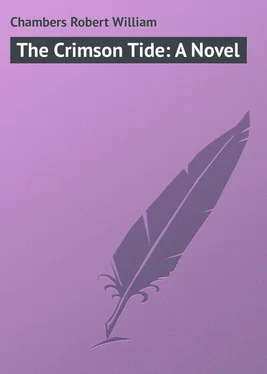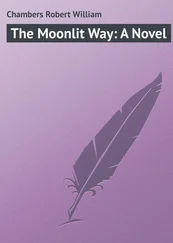Robert Chambers - The Crimson Tide - A Novel
Здесь есть возможность читать онлайн «Robert Chambers - The Crimson Tide - A Novel» — ознакомительный отрывок электронной книги совершенно бесплатно, а после прочтения отрывка купить полную версию. В некоторых случаях можно слушать аудио, скачать через торрент в формате fb2 и присутствует краткое содержание. Жанр: foreign_prose, на английском языке. Описание произведения, (предисловие) а так же отзывы посетителей доступны на портале библиотеки ЛибКат.
- Название:The Crimson Tide: A Novel
- Автор:
- Жанр:
- Год:неизвестен
- ISBN:нет данных
- Рейтинг книги:4 / 5. Голосов: 1
-
Избранное:Добавить в избранное
- Отзывы:
-
Ваша оценка:
- 80
- 1
- 2
- 3
- 4
- 5
The Crimson Tide: A Novel: краткое содержание, описание и аннотация
Предлагаем к чтению аннотацию, описание, краткое содержание или предисловие (зависит от того, что написал сам автор книги «The Crimson Tide: A Novel»). Если вы не нашли необходимую информацию о книге — напишите в комментариях, мы постараемся отыскать её.
The Crimson Tide: A Novel — читать онлайн ознакомительный отрывок
Ниже представлен текст книги, разбитый по страницам. Система сохранения места последней прочитанной страницы, позволяет с удобством читать онлайн бесплатно книгу «The Crimson Tide: A Novel», без необходимости каждый раз заново искать на чём Вы остановились. Поставьте закладку, и сможете в любой момент перейти на страницу, на которой закончили чтение.
Интервал:
Закладка:
The Cossacks, who all possessed their portion of land, yelled with laughter. One of them called out to the Swedish girl for her opinion, and the fair young giantess strode gracefully out into the fire-ring, her cap in her hand and the thick blond ringlets shining like gold on her beautiful head.
“Listen! Listen to this soldier of the Death Battalion!” shouted the Cossacks in great glee. “She will tell us what the law should be!”
She laughed: “We fought for it–we women soldiers,” she said. “And the law we fought for was made when the first tyrant fell.
“This is the law: Freedom of mind; liberty of choice; an equal chance for all; no violence; only orderly debate to determine the will of the land.”
A Cossack said loudly: “ Da volna! Those who have nothing would take, then, from those who have!”
“I think not!” cried another,“–not in the Urals!”
Thunderous laughter from their comrades and cries of, “Palla! Let us hear our pretty boy, who has made for the whole world a law.”
Palla Dumont, her slender hands thrust deep in her great coat sleeves, and standing like a nun lost in mystic revery, looked up with gay audacity–not like a nun at all, now, save for the virginal allure that seemed a part of the girl.
“There is only one law, Tavarishi,” she said, turning slightly from her hips as she spoke, to include those behind her in the circle: “and that law was not made by man. That law was born, already made, when the first man was born. It has never changed. It comprehends everything; includes everything and everybody; it solves all perplexity, clears all doubts, decides all questions.
“It is a living law; it exists; it is the key to every problem; and it is all ready for you.”
The girl’s face had altered; the half mischievous audacity in defiance of her situation–the gay, impudent confidence in herself and in these wild comrades of hers, had given place to something more serious, more ardent–the youthful intensity that smiles through the flaming enchantment of suddenly discovered knowledge.
“It is the oldest of all laws,” she said. “It was born perfect. It is yours if you accept it. And this law is the Law of Love.”
A peasant muttered: “One gives where one loves.”
The girl turned swiftly: “That is the soul of the Law!” she cried, “to give! Is there any other happiness, Tavarishi? Is there any other peace? Is there need of any other law?
“I tell you that the Law of Love slays greed! And when greed dies, war dies. And hunger, and misery die, too!
“Of what use is any government and its lesser laws and customs, unless it is itself governed by that paramount Law?
“Of what avail are your religions, your churches, your priests, your saints, relics, ikons–all your candles and observances–unless dominated by that Law?
“Of what use is your God unless that Law of Love also governs Him?”
She stood gazing at the firelit faces, the virginal half-smile on her lips.
A peasant broke the silence: “Is she a new saint, then?” he said distinctly.
A Cossack nodded to her, grinning respectfully:
“We always like your sermons, little novice,” he said. And, to the others: “Nobody wishes to deny what she says is quite true”–he scratched his head, still grinning–“only–while there are Kurds in the world–”
“And Bolsheviki!” shouted another.
“True! And Turks! God bless us, Tavarishi,” he added with a wry face, “it takes a stronger stomach to love these beasts than is mine–”
In the sudden shout of laughter the girl, Palla, looked around at her comrade, Ilse.
“Until each accepts the Law of Love,” said the Swedish girl-soldier, laughing, “it can not be a law.”
“I have accepted it,” said Palla gaily; but her childishly lovely mouth was working, and she clenched her hands in her sleeves to control the tremor.
Silent, the smile still stamped on her tremulous lips, she stood for a few moments, fighting back the deep emotions enveloping her in surging fire–the same ardent and mystic emotions which once had consumed her at the altar’s foot, where she had knelt, a novice, dreaming of beatitudes ineffable.
If that vision, for her, was ended–its substance but the shadow of a dream–the passion that created it, the fire that purified it, the ardent heart that needed love–love sacred, love unalloyed–needed love still, burned for it, yearning to give.
As she lifted her head and looked around her with dark eyes still a little dazed, there was a sudden commotion among the mujiks ; a Cossack called out something in a sharp voice; their officer walked hastily out into the darkness; a shadowy rider spurred ahead of him.
Suddenly a far voice shouted: “Who goes there! Stoi! ”
Then red flashes came out of the night; Cossacks ran for their horses; Ilse appeared with Palla’s pony as well as her own, and halted to listen, the fearless smile playing over her face.
“Mount!” cried many voices at once. “The Reds!”
Palla flung herself astride her saddle; Ilse galloped beside her, freeing her pistols; everywhere in the starlight the riders of the Wild Division came galloping, loosening their long lances as they checked their horses in close formation.
Then, with scarcely a sound in the unbroken snow, they filed away eastward at a gentle trot, under the pale lustre of the stars.
THE CRIMSON TIDE
CHAPTER I
On the 7th of November, 1917, the Premier of the Russian Revolutionary Government was a hunted fugitive, his ministers in prison, his troops scattered or dead. Three weeks later, the irresponsible Reds had begun their shameful career of treachery, counselled by a pallid, black-eyed man with a muzzle like a mouse–one L. D. Bronstein, called Trotzky; and by two others–one a bald, smooth-shaven, rotund little man with an expression that made men hesitate, and features not trusted by animals and children.
The Red Parliament called him Vladimir Ulianov, and that’s what he called himself. He had proved to be reticent, secretive, deceitful, diligent, and utterly unhuman. His lower lip was shaped as though something dripped from it. Blood, perhaps. His eyes were brown and not entirely unattractive. But God makes the eyes; the mouth is fashioned by one’s self.
The world knew him as Lenine.
The third man squinted. He wore a patch of sparse cat-hairs on his chin and upper lip.
His head was too big; his legs too short, but they were always in a hurry, always in motion. He had a persuasive and ardent tongue, and practically no mind. The few ideas he possessed inclined him to violence–always the substitute for reason in this sort of agitator. It was this ever latent violence that proved persuasive. His name was Krylenko. His smile was a grin.
These three men betrayed Christ on March 3d, 1918.
On the Finland Road, outside of Petrograd, the Red ragamuffins held a perpetual carmagnole, and all fugitives danced to their piping, and many paid for the music.
But though White Guards and Red now operated in respectively hostile gangs everywhere throughout the land, and the treacherous hun armies were now in full tide of their Baltic invasion, there still remained ways and means of escape–inconspicuous highways and unguarded roads still open that led out of that white hell to the icy but friendly seas clashing against the northward coasts.
Diplomats were inelegantly “beating it.” A kindly but futile Ambassador shook the snow of Petrograd from his galoshes and solemnly and laboriously vanished. Mixed bands of attachés, consular personnel, casuals, emissaries, newspaper men, and mission specialists scattered into unfeigned flight toward those several and distant sections of “God’s Country,” divided among civilised nations and lying far away somewhere in the outer sunshine.
Читать дальшеИнтервал:
Закладка:
Похожие книги на «The Crimson Tide: A Novel»
Представляем Вашему вниманию похожие книги на «The Crimson Tide: A Novel» списком для выбора. Мы отобрали схожую по названию и смыслу литературу в надежде предоставить читателям больше вариантов отыскать новые, интересные, ещё непрочитанные произведения.
Обсуждение, отзывы о книге «The Crimson Tide: A Novel» и просто собственные мнения читателей. Оставьте ваши комментарии, напишите, что Вы думаете о произведении, его смысле или главных героях. Укажите что конкретно понравилось, а что нет, и почему Вы так считаете.











